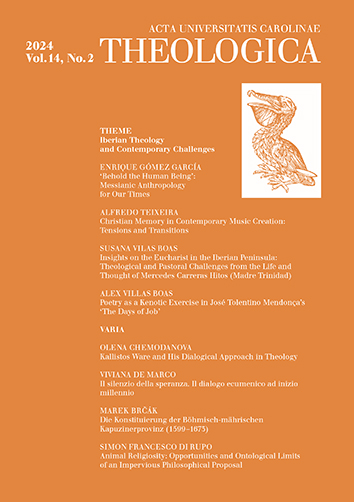AUC Theologica je recenzovaný odborný teologický časopis, který vychází dvakrát ročně. S výjimkou slavistických témat, recenzí a zpráv zveřejňuje příspěvky pouze ve světových jazycích – v angličtině, němčině, francouzštině a italštině.
Časopis se zaměřuje na širokou škálu teologických disciplín, jako je například systematická teologie, biblistika, patristika, pastorální a spirituální teologie, katechetika nebo církevní historie. V rámci nich se snaží reflektovat současná témata, která často vyžadují interdisciplinární přístup. Vítáme také teologické články, které se dotýkají jiných akademických oborů, jako je například filosofie, sociologie, literární věda či vědy přírodní.
Každé číslo se skládá ze dvou sekcí. Tematická sekce obsahuje články s jednotným zaměřením. V sekci s názvem „Varia“ publikujeme původní studie na různá aktuální teologická témata. Všechna čísla časopisu jsou dostupná v režimu Open Access.
AUC THEOLOGICA, Vol 6 No 1 (2016), 105–117
Angels as Mirrors of the Human: The Anthropologies of Rilke and Bonaventure through the Lenses of Hans Urs von Balthasar
Yves De Maeseneer
DOI: https://doi.org/10.14712/23363398.2016.6
zveřejněno: 01. 07. 2016
Abstract
In this article we present a theological-anthropological exploration, interpreting the figure of the angel as a mirror of our human condition. The point of departure is an analysis of Hans Urs von Balthasar’s approach to two major sources of our imagination of the angel: Bonaventure (1221−1274) and Maria Rainer Rilke (1875−1926). A comparison of his accounts of the Franciscan theologian and the Modern poet, respectively, reveals remarkable parallels in discourse, clustered around the tensions between vulnerability and openness, immanence and transcendence, and love and loss. Both Rilke and Bonaventure reject the classical angel figure as a human ideal, as it cannot integrate the paradoxes of human existence. Their alternative visions of what it means to be human, have many terms in common: heart, vulnerability, mortality, openness, abyss, suspension, transparency, receptivity, descent (kenosis), humility, poverty, etc. However, their meaning is different because Rilke does not recognize an absolute transcendence as the source of love and the vis-a-vis of the human. This immanentism leaves him no other option than the vain attempt to exorcize the angel figure altogether, while Bonaventure’s vision preserves the angel as an anthropological mirror, albeit an angel radically transfigured by God’s wounded love.
klíčová slova: Theological anthropology; angels; Hans Urs von Balthasar; Bonaventure; Rainer Maria Rilke

Angels as Mirrors of the Human: The Anthropologies of Rilke and Bonaventure through the Lenses of Hans Urs von Balthasar is licensed under a Creative Commons Attribution 4.0 International License.
148 x 210 mm
vychází: 2 x ročně
cena tištěného čísla: 100 Kč
ISSN: 1804-5588
E-ISSN: 2336-3398
